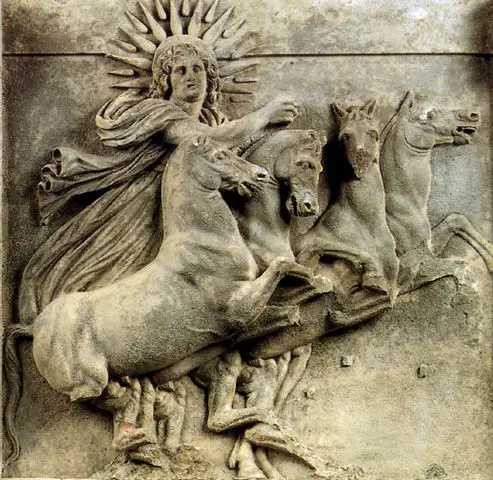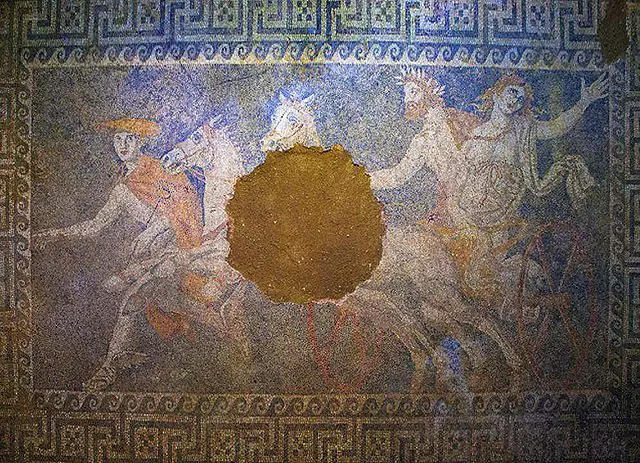| Further Reading | The 4 Most Important City-States Of Classical Greece |
Today shows, games, and books from around the world draw inspiration from ancient Greek mythology. Famous characters such as Hades, Zeus, Ares, Artemis, and Athena are commonly found in western media. While the mythology has endured, when did the actual practice of the ancient Greek religion end?
Generally speaking the classical Greek religion ended around the 9th century AD with the rise of Christianity across Greece. In select pockets in the eastern Peloponnese peninsula the Greek religion would continue to be practiced until the 12/13th century in different forms but would come to an end during the Crusades.
Here at The History Ace I strive to publish the best history articles on the internet. If at the end you enjoyed this article then consider subscribing and sharing around the web.
Without further ado, here is when the practice of Greek mythology as a religion ended.
Ancient Greek Religion Ending In The 9th Century AD
Most academics who study ancient Greece come to the conclusion that the ancient Religion stopped being publicly practiced between the years of 850-900 AD.
The reason the ancient Greek religion stopped being publicly practiced around the 9th century AD was because of several massive invasions which sought to force a unity among the Hellenic people. In order to control this unity, the previous culture was slowly replaced with a new invading culture which sought to unify the population.
The problem was that ancient Greece was never unified. Each city-state had its own culture and traditions. While the religion was largely the same there were differences in each city. For example, during the classical era Sparta would practice different religions festivals then Athens. This was why Sparta never showed up to the battle of Marathon.
However, starting in the 5th century AD the Greek city-states would see several invasions. In 479 Macedonia invaded Greece and In 579 the Slavs invaded Greece. Each of these groups sought to remove ancient culture to help to unify the city-states.
In 610 AD Byzantine Emperor Heraclius would attempt to completely unify the Greek population by making Greek the official language of the Empire. This created a problem by forcibly linking the Greek peninsula with the rest of the Christian empire.
In the 8th century AD the Greek peninsula would fall under the religious authority of the Pope of the Catholic Church. This would create a massive societal shift where ‘pagan’ practices were to be outlawed in favor of promoting the spread of medieval Christianity.
As a result of these invasions and cultural shifts much of the ancient Greek religion would stop being publicly practiced around the 9th century AD. Historians are not sure if privately the religion lived on.
Select Sections Of The Peloponnese Peninsula Practiced The Ancient Greek Religion Until The 12th Century
While most of Greece would stop practicing the ancient religion sometime in the 9th century AD we do have examples of select communities still practicing it until the late medieval era.
The Tsakonia people of modern Greece lived in the mountains surrounding the Doric people. Here the imposed cultures and customs of invading forces could not easily pernitrate. Because of this the old Greek religion was fused with Christian ideals to create a new ancient Greek religion. Today we can see evidence of this in the old Tsakonian language creating words for Christianity influences. This demonstrates an older religion which was practiced well in the medieval era.
These Tsakonian people more then likely continued to practice the ancient Greek religion publicly for several hundred years past their fellow Greeks. Byzantine reports from the medieval era call the Tsakonian people barbaric in both their speech and mannerisms.
Besides the Tsakonian people there was another group of ancient Greeks that continued to practice the ancient Greek religion past the 9th century AD. The Maniots of southern Greece lived high up in the mountains. This group of people were fierce warriors who claim to be descended from the ancient Spartan people.
Using the mountains to their advantage these people would prevent any attempt at Byzantine or Catholics to convert their religion and customs. Even though the region of Mani was formally converted during the 9th century AD there are reports of the ancient Greek religion surviving for several centuries up through the middle ages.
As such in select portions of medieval Greece the ancient Greek religion would continue to survive and be practiced well up through the middle ages.
Conclusion
There you have it; an entire article dedicated to the question of when the practice of ancient Greek mythology as a religion ended.
Generally speaking the ancient Greek religion ended sometime in the 9th century AD. However, in isolated pockets around the country the ancient religion would continue to be practiced openly. Sometime during the medieval era this would begin to end publicly. Historians are unsure if the religion continued to be practiced privately.
Here at The History Ace I strive to publish the best history articles on the internet. If you enjoyed this article then consider subscribing to the free newsletter and sharing around the web.
Further, you can check out some of the other articles below.
-
How The American Revolution Changed The World

Here is how the American Revolution changed the world. Many people are not aware of just how important this event actually was.
-
Why The Roman People Loved Chariot Racing

Why did the Roman people love chariot racing? Well it all comes down to these 3 reasons.
-
The Design and Color of Roman Chariots

What was the design and color of Roman Chariots? Were they faster or slower then normal chariots? Well here is everything!
Sincerely,
Nick